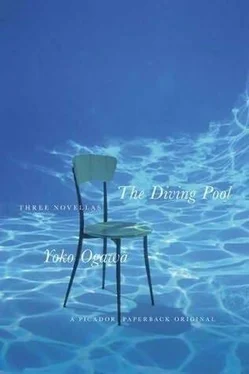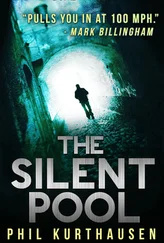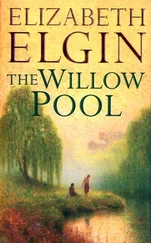Reiko's parents were both in a mental hospital. Their problems were apparently very serious, with no hope that they would recover and return to normal life.
"They'll miss you if you don't go." I knew that she didn't like talking about her parents, but I brought them up as often as possible. The children here suffered from almost every imaginable misfortune, yet it struck me as particularly bad luck to have both parents go crazy, one after the other.
"I wish they would miss me," she said. Closing the magazine, she sat up on the bed and took off her glasses. "I'd be glad if they did." With her glasses off, her eyes were so small it was hard to tell where she was looking.
"And that's what makes you so sad?" I asked.
She blinked nervously but said nothing. Her vacant stare confounded my efforts to understand what she was feeling. Her lips were pursed in what might have been a faint smile, but it might also have been a wounded frown. There were several seconds of icy silence.
"The hooks have come undone," she said at last, as if talking to herself.
"Hooks?"
"That's right. The ones that kept my mother and father and me together. They've come undone and there's no way to get them fastened again." Sometimes she spoke like a young lady from a good family.
I wondered what sort of sound was made when the hooks holding together a family came apart. Perhaps a dull splat, like the sound of a ripe fruit splitting open. Or maybe it was more like an explosion, when you mix the wrong chemicals.
Reiko was still looking down at me blankly, the fat on her cheeks and chin hiding her feelings. She put her glasses on again, stretched out on the bed, and went back to her magazine.
Perhaps the wounds she'd received when the hooks broke were still raw. But since I'd never been hooked to anything, I couldn't see much difference in our luck.
I turned back to the desk and began writing unintelligible English words in my notebook. The children were even louder now, but their noise had no effect on the silence that fell between us.
The Light House was always noisy: a mixture of shouting and crying and pounding feet filled every corner of the building like some resident spirit.
Just then, an urgent knock sounded at the door, and the part-time nurse came in carrying Rie in her arms.
"We're going to take the children to the bazaar at the church, but Rie seems to be coming down with a cold. Could we leave her here with you?" She spoke quickly, rocking the child in her arms.
"Sure," I said, getting up from the desk to take Rie. "I'll look after her."
"Do you want to go with us, Reiko?" the nurse said, looking toward the top bunk.
"It's very kind of you to invite me, but I'm afraid I have other things I have to do today." As always, Reiko's refusal was excessively polite.
At a year and five months, Rie was the youngest child at the Light House. She wore a bright red playsuit over her white shirt, and her nose was shiny and damp.
The din from the children reached a crescendo and then subsided as they left with the three nurses. I took Rie downstairs and out in the backyard.
The brilliant sunlight made the shadowy places seem fresh and clean, and the objects in them-a tricycle, a broken flowerpot, every leaf and weed-stood out vividly. Cases of bottles waiting to be recycled and an empty box with a picture of asparagus were piled by the kitchen door.
After the fig tree had stopped bearing fruit, it was cut down, leaving only a small mound of earth where the well had been. Rie was amusing herself by sticking a little shovel into this mound while I watched from a short way off, seated on one of the cases of bottles.
The tiny legs protruding from the elastic hems of her pants looked like pats of smooth, white butter. Whether they are dark and blotchy, covered in a rash, or rippling with rings of fat, I am always fascinated by a baby's thighs. There is something almost erotic about their defenselessness, and yet they seem fresh and vivid, like separate living creatures.
Rie was scooping up dirt with the shovel she held in one hand and dumping it into the bucket she held in the other. She had been doing this for some time, but when she missed the bucket and spilled the dirt on her hand, she came staggering toward me on unsteady little legs, crossing the boundary between bright sunlight and quiet shade. She made little pleading noises as she held out her soiled hand. It seemed clean enough to me, but I blew on her palm anyway.
Children Rie's age have a peculiar odor: the dustiness of disposable diapers mixed with the pulpy smell of baby food. But in Rie's case, there was an added scent, like fresh butter at the moment you peel away the foil wrapper.
She went back to her game, yet every few minutes she would stop and come over to have me dust off her hands. The simple regularity with which she did this gradually put me in a cruel mood. However, I didn't find the feeling particularly unpleasant; in fact, there was something agreeable about it. This cruel impulse had been coming over me quite often then. It seemed to be concealed somewhere in the spaces between my ribs, and the strange baby smell brought it out, almost as though plucking it from my body. The pain of its emergence comforted me as I stood watching Rie.
Then, while she had her back turned, I slipped behind the kitchen door. After a few moments, the dirt on her hands began to bother her again and she dropped the shovel and bucket at her feet and stood staring at her palms. Finally, she turned for help toward the spot where I should have been sitting. As it dawned on her that I wasn't there, that she'd been left alone, she began crying in earnest. Her sobs were violent, seemingly about to rupture something inside her, and they were satisfying my cruel urge. I wanted her to cry even harder, and everything seemed perfectly arranged: no one would come to pick her up, I would be able to listen to my heart's content, and she was too young to tell anyone afterward.
When we grow up, we find ways to hide our anxieties, our loneliness, our fear and sorrow. But children hide nothing, putting everything into their tears, which they spread liberally about for the whole world to see. I wanted to savor every one of Rie's tears, to run my tongue over the damp, festering, vulnerable places in her heart and open the wounds even wider.
A dry breeze tugged at her straggly hair. The sun was still high in the sky, as if it were no longer setting, as if time had stopped. She continued to sob violently, barely able to catch her breath.
When I finally appeared from behind the door, she wailed even louder and came running to throw herself in my arms, her buttery little thighs churning all the way. As I lifted her up and held her, the sobs subsided into pitiful whimpers that barely hinted at her vanished anger. Damp with tears and snot, the little cheeks pressed against my chest, and with them came that strange child smell. The arrogance of Rie's self-assurance restored my cruel thoughts.
My eyes wandered to the large urn abandoned at the edge of the woods in back. Once a decoration in a hall at the Light House, it was a Bizen pot, nearly as tall as a man's chest. I carried Rie to it, rubbing her back to quiet her ragged breathing. Then I removed its lid of rotting boards and slowly lowered her inside.
I wanted to hear her cry louder. I wanted to hear every kind of howl or sob she could produce. Her legs contracted in terror, as if she were going into convulsions, and she clung to my arms.
"It's all right," I said, shaking off her tiny fingers. "Don't be afraid."
Inside, the urn was cool and damp. She flailed about, screaming at the top of her lungs. Her cries came pouring up and into me like a stream of molten steel. I gripped the mouth of the urn with both hands to keep it from toppling over and stared down at Rie's futile struggles.
Читать дальше












